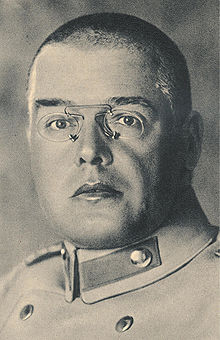Max Hoffmann
| Max Hoffmann | |
|---|---|
 |
|
| Born |
25 January 1869 Homberg (Efze), Upper Hesse, Grand Duchy of Hesse |
| Died | 8 July 1927 (aged 58) Bad Reichenhall, Bavaria, Weimar Republic |
| Allegiance |
|
| Service/branch | Imperial German Army |
| Years of service | 1887–1918 |
| Rank | Generalmajor |
| Battles/wars | World War I |
| Awards |
Pour le Mérite Iron Cross First class |
Carl Adolf Maximilian Hoffmann (25 January 1869 – 8 July 1927) was a German military strategist. As a staff officer at the beginning of World War I, he was Chief of Staff of the 8th Army. Hoffmann, along with Hindenburg and Ludendorff, masterminded the devastating defeat of the Russian armies at Tannenberg and the Masurian Lakes. He then held the position of Chief of Staff of the Eastern Front. At the end of 1917, he negotiated with Russia to sign the Treaty of Brest-Litovsk. In 1922, he tried to set up an anti-Soviet coalition without success.
Hoffmann was born in Homberg (Efze). He studied at the Prussian Military Academy and joined the Prussian Army in 1887 as part of the 4th Thuringian Infantry Regiment.
Hoffmann attended the War College in Berlin, graduating in 1889 and winning appointment to the General Staff. He spent six months in Russia as an interpreter and five years in the Russian section of the General Staff where he became a specialist in Russian affairs and was tasked with trying to determine Russia's plan of attack in the eventuality of war between Germany and Russia. During the Russo-Japanese War, he served as Germany's military observer with the Japanese First Army in Manchuria.
At the outbreak of World War I Lieutenant Colonel Hoffmann was the deputy chief of staff of the German Eighth Army, the only German military unit defending East Prussia from a Russian attack. The remainder of the German Army, following the Schlieffen Plan, was massed in the west attempting to gain the decisive victory that would knock France out of the war. The Russian First army invaded East Prussia across its eastern frontier, the Germans attacked them unsuccessfully at the Battle of Gumbinnen on 20 August 1914. Then they learned that the Russian Second Army was approaching their southern frontier. To avoid being cut off the alarmed Eighth Army commander, Maximilian von Prittwitz, proposed to retreat over the River Vistula , abandoning East Prussia to the Russians. Prittwitz and his chief of staff were immediately relieved in favor of Paul von Hindenburg and Erich Ludendorff.
...
Wikipedia
